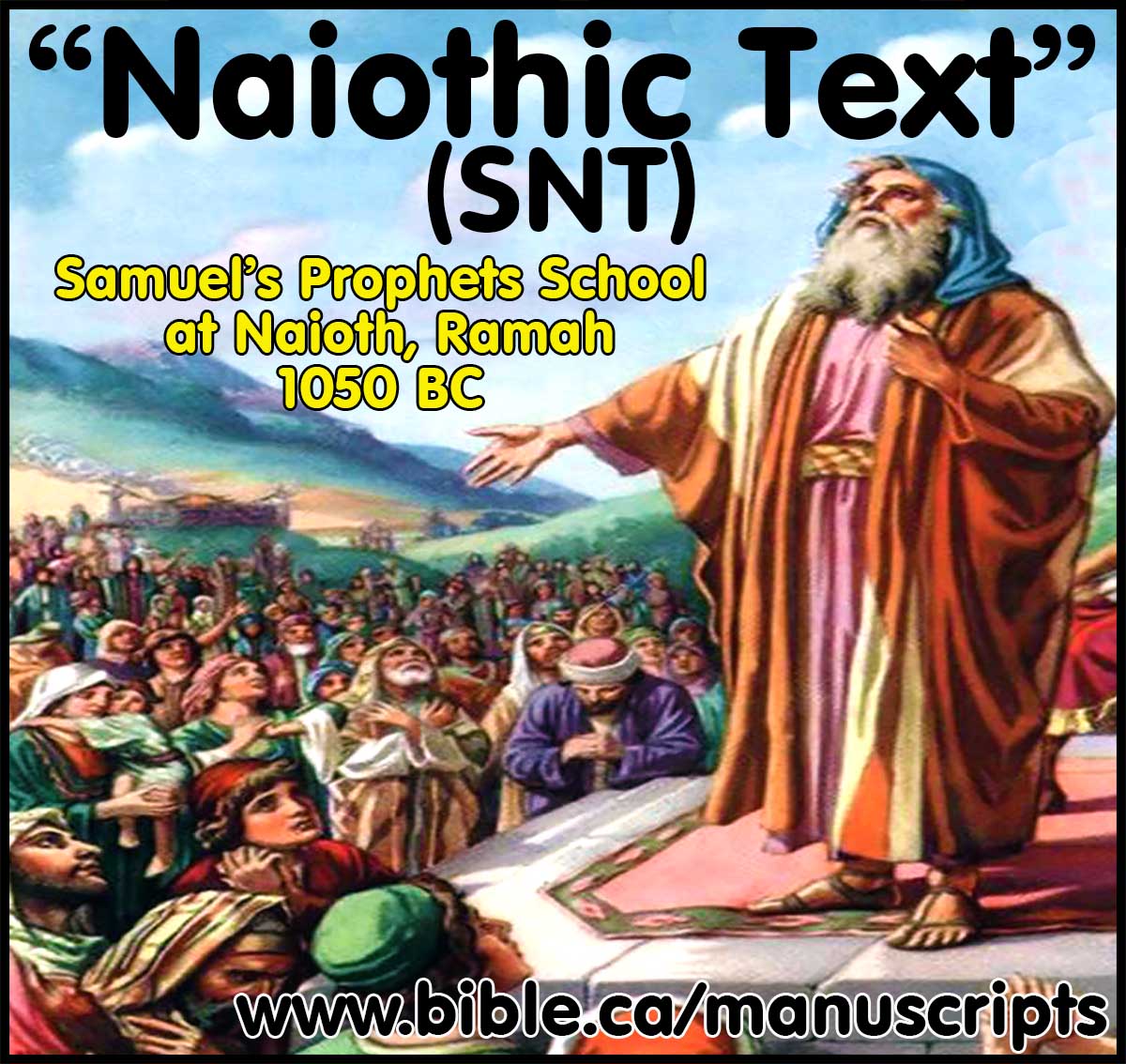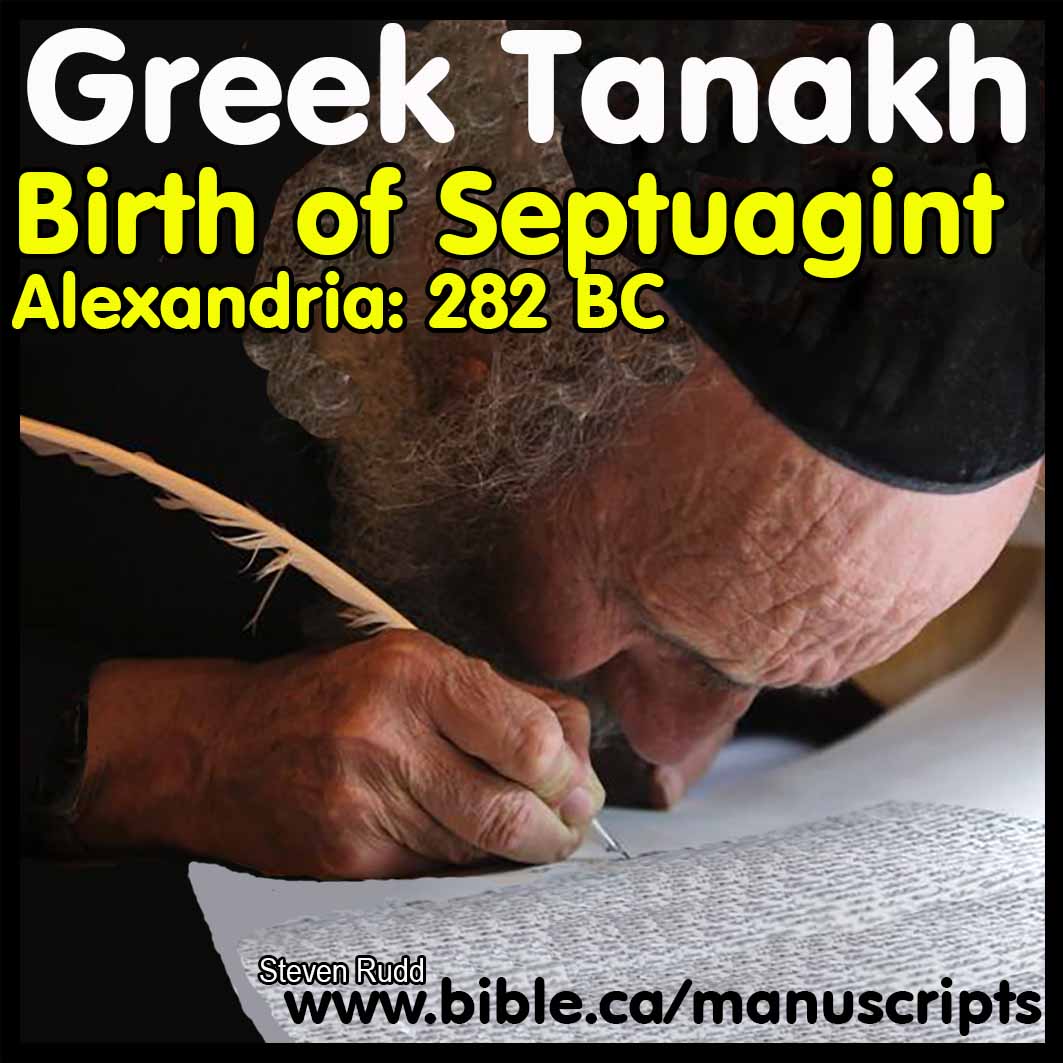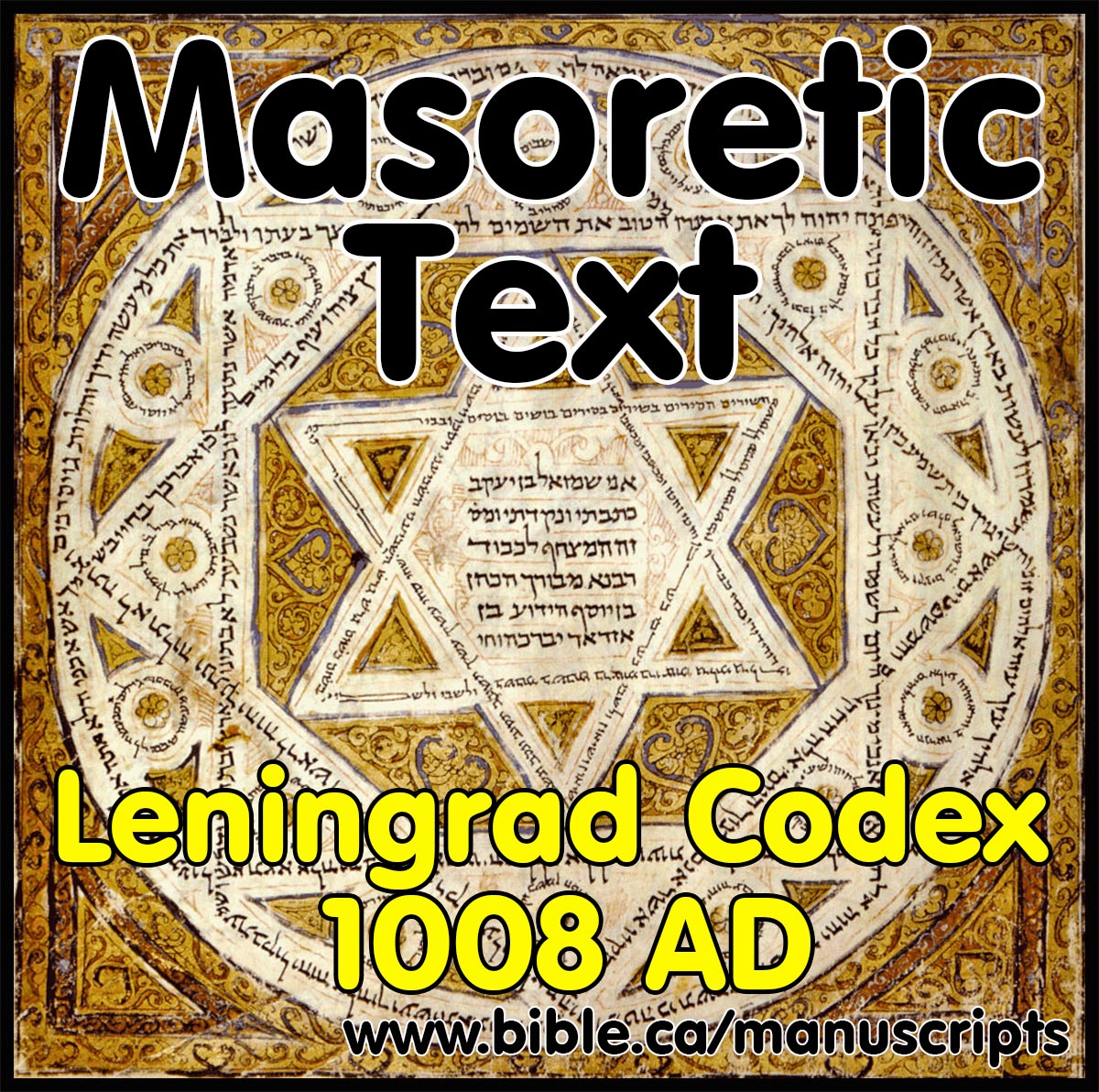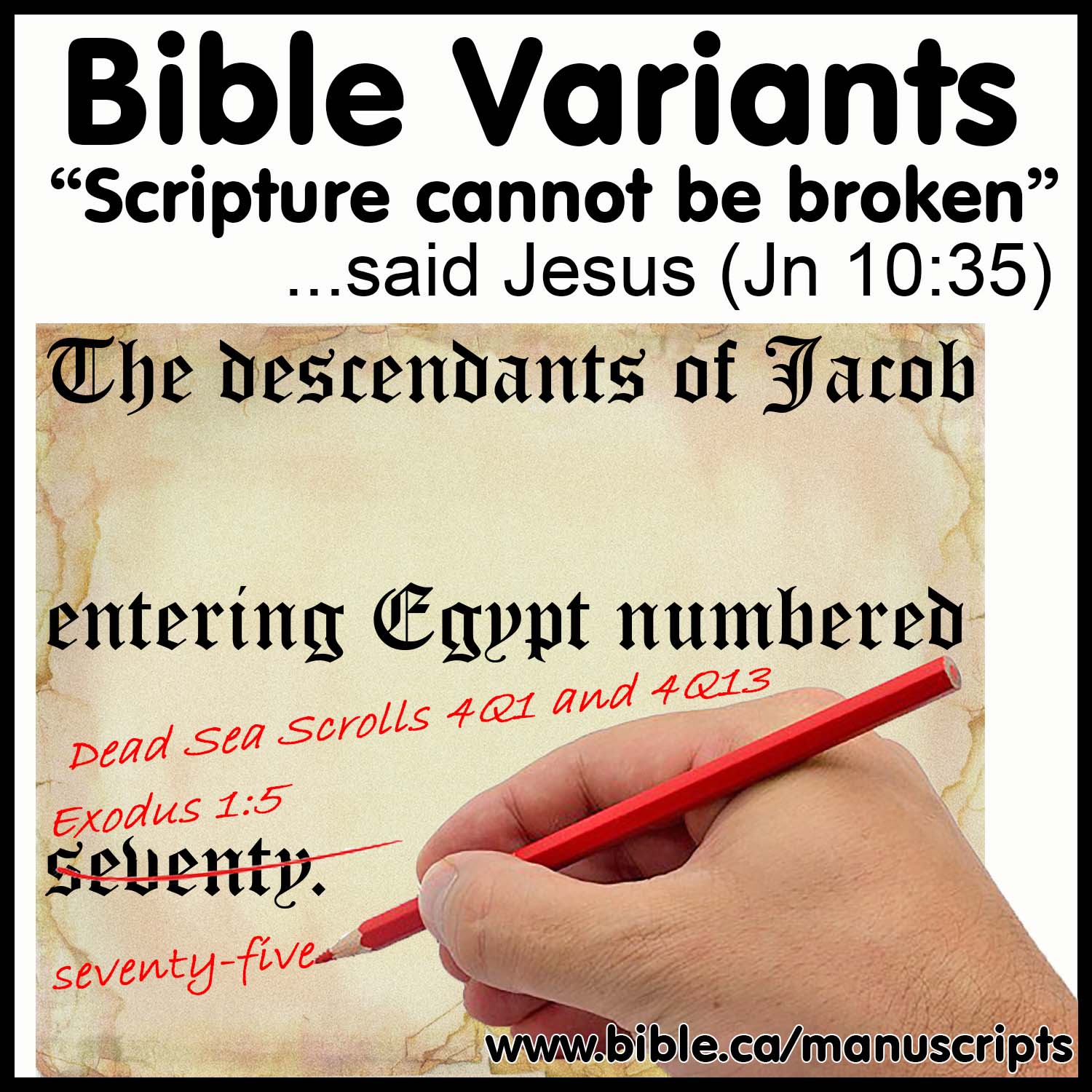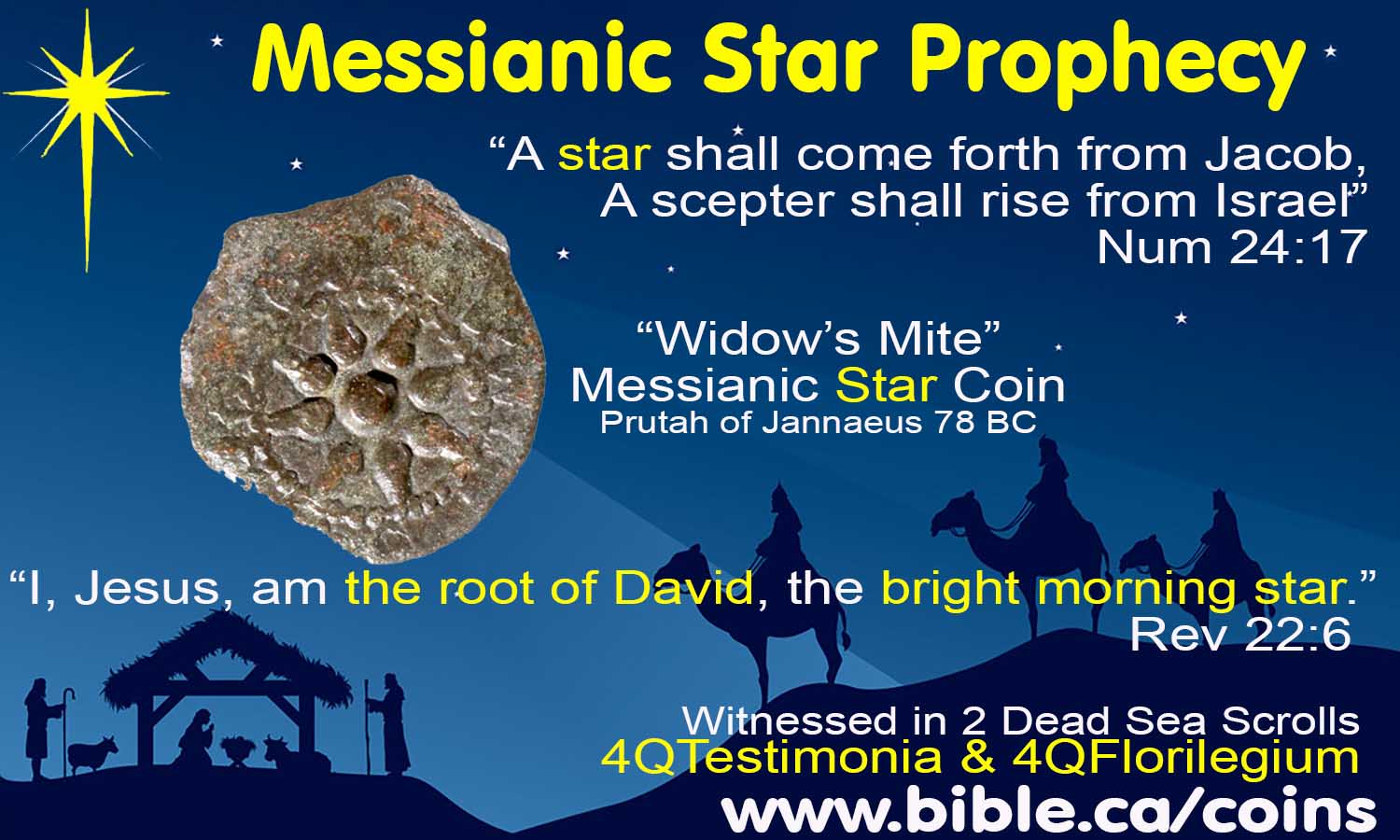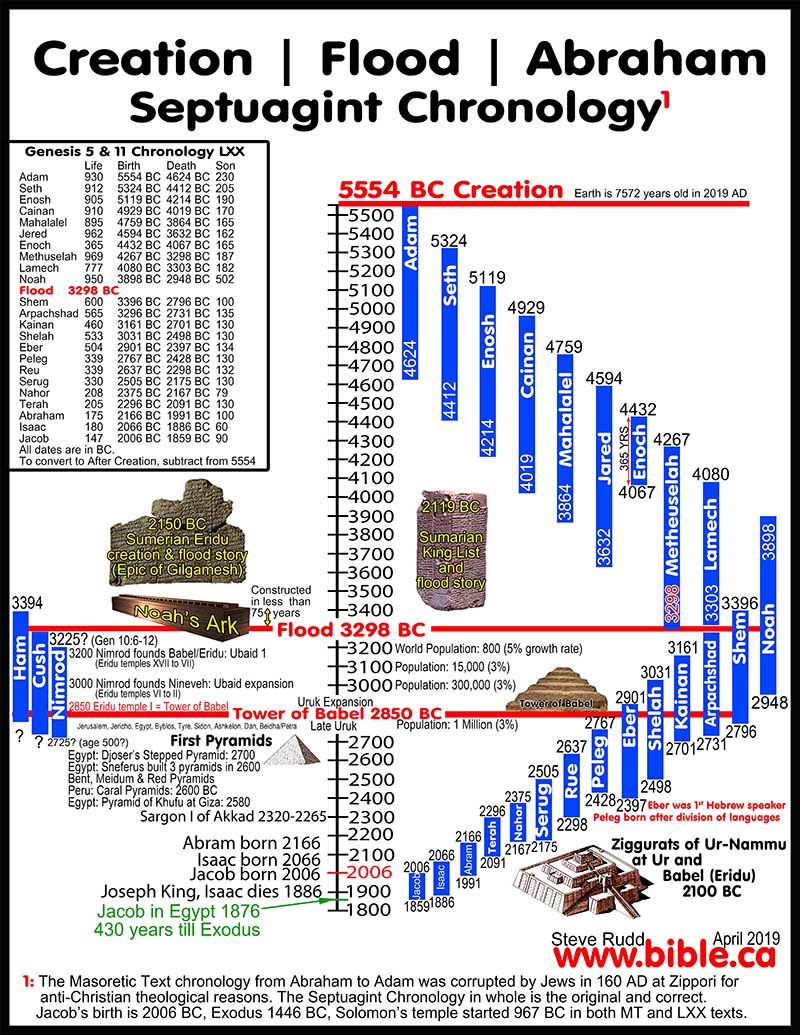Augustine of Hippo
400 AD
Genesis 5,11 Chronology: Septuagint vs. Masoretic
Augustine the Jellyfish, accepts the two different sets of numbers as inspired.
“For from Adam to the deluge there are reckoned,
according to our copies of Scripture [Septuagint],
2262 years, and according to the Hebrew text, 1656 years.”
(Constantine, Aug., De civ. Dei 15.20.2)
Introduction:
1. Augustine was a theological Jellyfish with poor logical skills who felt at ease in teaching things that directly contradicted the Bible.
a. Augustine is a good example of “just because you write a lot of stuff doesn’t mean you have any idea what you are talking about”. Kind of like the internet today!
b. Augustine is known for a lot of strange theology and ideas in his many writings since he is considered the father of 16th century Calvinism.
c. Clearly in intellectual, he did openly discuss many subjects in detail.
d. The value of Augustine is not in the wacky stuff he believed, but in observing the pro and con arguments and opinions of himself and others on the subject at the time he lived.
2. Augustine believed and taught many things that directly contradicted the Bible, for example, like the age of Terah when Abraham was born.
a. HOLY SPIRIT: "Terah lived seventy years, and became the father of Abram, Nahor and Haran." (Genesis 11:26). Notice that it is certain that the three brothers were not triplites and the ancient Jews wrongly assumed Abraham was firstborn.
b. Stephen clearly said under inspiration that Abraham did not leave Haran at age 75 until his father Terah died at age 205 years old.
c. While it was almost universally (wrongly) believed that Terah was only 70 years old, the Holy Spirit corrected this error.
d. HOLY SPIRIT: “Then he left the land of the Chaldeans and settled in Haran. From there, after his father died, God had him move to this country in which you are now living." (Acts 7:4)
e. AUGUSTINE: “Now Abraham was seventy-five years old when he departed out of Haran.” How can this be true if he departed from Haran after his father’s death? For when Terah was seventy years old, as is intimated above, he begat Abraham; and if to this number we add the seventy-five years which Abraham reckoned when he went out of Haran, we get 145 years. Therefore that was the number of the years of Terah, when Abraham departed out of that city of Mesopotamia; for he had reached the seventy-fifth year of his life, and thus his father, who begat him in the seventieth year of his life, had reached, as was said, his 145th. Therefore he did not depart thence after his father’s death, that is, after the 205 years his father lived; but the year of his departure from that place, seeing it was his seventy-fifth, is inferred beyond a doubt to have been the 145th of his father, who begat him in his seventieth year.” (Aug., De civ. Dei 16.15.1)
f. The solution is that Genesis 11:26 says the first of the three brothers was born when Terah was 70, but that Abraham was born when Terah was 130 years old.
g. Augustine, never even considered this rather simple solution, IN SPITE of direct revelation in the New Testament which he chose to contradict.
3. An example of the wacky ideas of Augustine is that Adam and Eve had mechanical sex without lust in the Garden of Eden. Augustine was caught between being obsessed and being a prude about sex. Adam basically was a man-robot who did not find his wife sexy or sexually attractive. Reproduction was purely an intellectual decision with no more erotic pleasure than chopping wood to cook the evening meal.
a. “How in the world, then, can any one believe that, in a life so happy and with men so blessed, parenthood was impossible without the passion of lust? Surely, every member of the body was equally submissive to the mind and, surely, a man and his wife could play their active and passive roles in the drama of conception without the lecherous promptings of lust, with perfect serenity of soul and with no sense of disintegration between body and soul. Merely because we have no present experience to prove it, we have no right to reject the possibility that, at a time when there was no unruly lust to excite the organs of generation and when all that was needed was done by deliberate choice, the seminal flow could have reached the womb with as little rupture of the hymen and by the same vaginal ducts as is at present the case, in reverse, with the menstrual flux. And just as the maturity of the fetus could have brought the child to birth without the moanings of the mother in pain, so could connection and conception have occurred by a mutually deliberate union unhurried by the hunger of lust.” (Augustine, Aug., De civ. Dei 14.26)
4. Around 400 AD, Augustine was fully aware of the variance in the Genesis chapter 5 and 11 chronologies between the Hebrew Masoretic Text and the Septuagint but he blames it on God!
a. “For this difference has not been reckoned a falsification; and for my own part I am persuaded it ought not to be reckoned so… we must believe that the divine Spirit prompted them to give a varying version.” (Augustine, Aug., De civ. Dei 15.14.2)
b. “Thus, in all, from the flood to Abraham, we have 1,072 years, according to the Latin translation of the Septuagint. It is said that in the Hebrew text, however, the number of years given is far smaller—which is very difficult, if not impossible, to explain.” (Augustine, Aug., De civ. Dei, City of God, 16.10)
c. Augustine points out the only problem with the Septuagint, namely that Methuselah lived 14 years after the flood. Of course, we know today that this was likely an original scribal error in 282 BC which got transmitted throughout the world when the Septuagint was distributed to all the synagogues.
I. Who changed the Genesis 5 & 11 Chronology: Jews or Christians?
1. Augustine takes note of the two sets of numbers:
a. “Thus, in all, from the flood to Abraham, we have 1,072 years, according to the Latin translation of the Septuagint. It is said that in the Hebrew text, however, the number of years given is far smaller—which is very difficult, if not impossible, to explain.” (Augustine, Aug., De civ. Dei, City of God, 16.10)
b. Augustine says the variance is impossible to explain.
c. Augustine’s answer was that God through the inspiration of the scribes who translated to Hebrew to Greek in 282 BC wanted both sets o numbers to exist as a deliberate God ordained variance between the Hebrew and Greek texts of the Torah.
d. Unlike many of his fellow churchman, Augustine clearly throws no suspicion upon the Jews for changing the Hebrew Text.
e. Augustine accepts both Chronologies as equally authoritative.
f. As we said, Augustine was a jellyfish with poor logical skills.
2. Augustine was well aware that the prevailing opinion of his collogues, was that the Jews corrupted their Hebrew Bible and that that the Greek Septuagint preserved the original numbers. Augustine rejects the view that the Jews corrupted their own Bible against prevailing opinion of Christians.
a. THE PREVAILING OPINION OF AUGUSTINE’S FELLOW CHURCHMEN: “They say that it is not credible that the seventy translators, who simultaneously and unanimously produced one rendering, could have erred, or, in a case in which no interest of theirs was involved, could have falsified their translation; but that the Jews, envying us our translation of their Law and Prophets, have made alterations in their texts so as to undermine the authority of ours. This opinion or suspicion let each man adopt according to his own judgment.” (Augustine, De civ. Dei 15.11.1)
b. “This hypothesis they adopt, that they may not cast a slight on the trustworthiness of versions which the Church has received into a position of high authority, and because they believe that the Jewish manuscripts rather than our own are in error.” (Augustine Aug., De civ. Dei 15.11.1)
c. Although Augustine rejected the idea that the Jews corrupted their chronologies in Gen 5,11, he takes specific note that was a widely held opinion of the day. Augustine was wrong and the prevailing opinion that the Jews changed their Torah chronology was true.
II. The majority view was that the Jews corrupted the Hebrew text:
1. Augustine outright rejected the entire idea that the Jews corrupted their own Tanakh as impossible.
a. Augustine said: “This opinion or suspicion [that the Jews corrupted the Hebrew Bible] let each man adopt according to his own judgment.” (Augustine, De civ. Dei 15.11.1)
b. Augustine chose poorly. The Jews did corrupt their own Bible for anti-Christian purposes in 160 AD just like Ezra had done in 458 BC for anti-Samaritan purposes by changing the location of Joshua’s alter from Mt. Gerizim to Mt Ebal.
c. Notice that in both cases, you had the entire collection of Hebrew manuscripts in the hands of a small number of men who created a single manuscript that would come to dominate the world, within a population who were Hebrew illiterate.
2. Augustine documents the view of his own churchmen that the Jews corrupted the Hebrew Text and that the chronolgocial numbers in the Septuagint were original:
a. “that the Jews, envying us our translation of their Law and Prophets, have made alterations in their texts so as to undermine the authority of ours. This opinion or suspicion let each man adopt according to his own judgment.” (Augustine, De civ. Dei 15.11.1)
b. “It is one of the Jews’ lies” (Augustine Aug., De civ. Dei 15.13.1)
c. “the malicious and wrong-headed Jews, tampered the many manuscripts” (Augustine Aug., De civ. Dei 15.13.1)
d. “This hypothesis they adopt, that they may not cast a slight on the trustworthiness of versions which the Church has received into a position of high authority, and because they believe that the Jewish manuscripts rather than our own are in error.” (Augustine Aug., De civ. Dei 15.11.1)
e. “For this difference has not been reckoned a falsification” (Augustine, Aug., De civ. Dei 15.14.2)
III. When did the Jews corrupt their Hebrew pre-Masoretic text: 282 BC or 160 AD
1. Augustine gives the only two options as to when the chronological numbers where changed:
a. “They say that it is [282 BC] not credible that the seventy translators, who simultaneously and unanimously produced one rendering, could have erred, or, in a case in which no interest of theirs was involved, could have falsified their translation; [after the birth of the church] but that the Jews, envying us our translation of their Law and Prophets, have made alterations in their texts so as to undermine the authority of ours. This opinion or suspicion let each man adopt according to his own judgment.” (Augustine, De civ. Dei 15.11.1)
b. OPTION #1: The original LXX translators in 282 BC corrupted the text long before the rise of Christianity.
c. OPTION #2: Jealous Jews after the rise of Christianity corrupted the text.
III. Augustine understood one possible correct solution on Methuselah living 14 years after the flood in the Septuagint Chronology.
1. There are in fact many simply solutions to the problem of Methuselah living 14 years after the flood in the LXX chronology:
a. The Hebrew original in Jerusalem contained the error. The translators in Alexandria replicated the error into the Greek LXX.
i. If the Hebrew text brought from Jerusalem to Alexandria in 282 BC contained the wrong number that had Methuselah living 14 years after the flood, it would have been a scribal error that perhaps dates back to the time of Ezra who converted the Tanakh from Paleo-Hebrew to Aramaic Hebrew in 458 BC.
ii. It is likely then that Ezra is responsible for the error in 458 BC and every copy down to 282 BC contained the error.
b. The Hebrew original Torah in Jerusalem loaned to the Jews in Alexandria did not contain the error.
i. The Alexandria translators introduced the scribal error into the Greek Torah. The Hebrew Torah in Jerusalem was error free but the translated Septuagint contained the new scribal error made by the translators. The copy in Jerusalem did not contain the error but the new Greek original in the Alexandria library did contain the error. Thousands of copies of the Torah were made from the Greek original in the Alexandria library and distributed throughout the world to every synagogue.
ii. The high priests in Jerusalem wanted to send a copy instead of the original. The error was made when the scribes in Jerusalem made a duplicate of the error free Hebrew original Torah in Jerusalem. The new copy with the error was then sent to Alexandria where the translators “faithfully replicated” the error made in Jerusalem. The original in Jerusalem remained error free but both the Hebrew copy in Alexandria and the Greek translation LXX contained the error. When copies were made and distributed the all contained the error.
2. Augustine was right that the Methuselah error could not happen after the LXX was distributed to each synagogue around the world but at the time of Translation or earlier.
a. [In this section, Augustine is not discussing only the Methuselah error but all the variants in the Genesis Chronology] “It is one of the Jews’ lies. This, however, we have disposed of above, showing that it cannot be that men of so just a reputation as the seventy translators should have falsified their version. However, if I ask them which of the two is more credible, that the Jewish nation, scattered far and wide, could have unanimously conspired to forge this lie, and so, through envying others the authority of their Scriptures, have deprived themselves of their verity; or that seventy men, who were also themselves Jews, shut up in one place (for Ptolemy king of Egypt had got them together for this work), should have envied foreign nations that same truth, and by common consent inserted these errors: who does not see which can be more naturally and readily believed? But far be it from any prudent man to believe either that the Jews, however malicious and wrong-headed, could have tampered with so many and so widely-dispersed manuscripts; or that those renowned seventy individuals had any common purpose to grudge the truth to the nations. One must therefore more plausibly maintain, that when first their labors began to be transcribed from the copy in Ptolemy’s library, some such misstatement might find its way into the first copy made, and from it might be disseminated far and wide; and that this might arise from no fraud, but from a mere copyist’s error.” (Augustine Aug., De civ. Dei 15.13.1)
3. Augustine discusses a universally recognized problem with the chronological numbers of Methuselah.
a. Notice that Augustine rejects the prevailing view that Jews recently corrupted their Bible.
b. “And therefore some suppose that, though he was not on earth (in which it is agreed that every living thing which could not naturally live in water perished), he was for a time with his father, who had been translated, and that he lived there till the flood had passed away. This hypothesis they adopt, that they may not cast a slight on the trustworthiness of versions which the Church has received into a position of high authority, and because they believe that the Jewish manuscripts rather than our own are in error. For they do not admit that this is a mistake of the translators, but maintain that there is a falsified statement in the original, from which, through the Greek, the Scripture has been translated into our own tongue. They say that it is not credible that the seventy translators, who simultaneously and unanimously produced one rendering, could have erred, or, in a case in which no interest of theirs was involved, could have falsified their translation; but that the Jews, envying us our translation of their Law and Prophets, have made alterations in their texts so as to undermine the authority of ours. This opinion or suspicion let each man adopt according to his own judgment.” (Augustine Aug., De civ. Dei 15.11.1)
c. Augustine notes that his fellow churchmen have total trust in the Septuagint and charge the Jews with corrupting their Hebrew chronology in Gen 5.
d. What is amazing, is that that both the churchmen were wrong and right at the same time. The Septuagint did contain a single error in the Methuselah chronology but they were right that the Jews had recently (160 AD) corrupted the Hebrew numbers for the balance of the Gen 5 chronology. This is what Augustine never grasped.
4. Today we know that the variance was either in the original pre-Septuagint Hebrew text or is a scribal translation error in the original Septuagint in 282 BC.
a. Even Augustine correctly noted: “For there are three Greek mss., one Latin, and one Syriac, which agree with one another, and in all of these Methuselah is said to have died six years before the deluge. (Augustine, Aug., De civ. Dei 15.13.3)
b. The contradictory number was found in all the copies everywhere, proving it was an original scribal error dating back to 282 BC. If the scribal error in the Septuagint was even as early as 200 BC, many conflicting copies would have been known to exist. This was the gist of Augustine’s argument:
i. “One must therefore more plausibly maintain, that when first their labors began to be transcribed from the copy in Ptolemy’s library, some such misstatement might find its way into the first copy made, and from it might be disseminated far and wide; and that this might arise from no fraud, but from a mere copyist’s error. This is a sufficiently plausible account of the difficulty regarding Methuselah’s life.” (Augustine Aug., De civ. Dei 15.13.1)
c.
Of course, we know that the distribution of the Septuagint was the very
engine that created the entire synagogue movement. Think of the Septuagint as
“synagogue seed”. Every place in the world that the Greek LXX was copied and
distributed the spiritually starved Greek speaking Jews gathered to read their
Bible and pray every Sabbath… giving birth to a synagogue. We also know that
synagogues were God’s bridge between temple worship and the Christian church.
See author’s book on the Origin
of Synagogues.
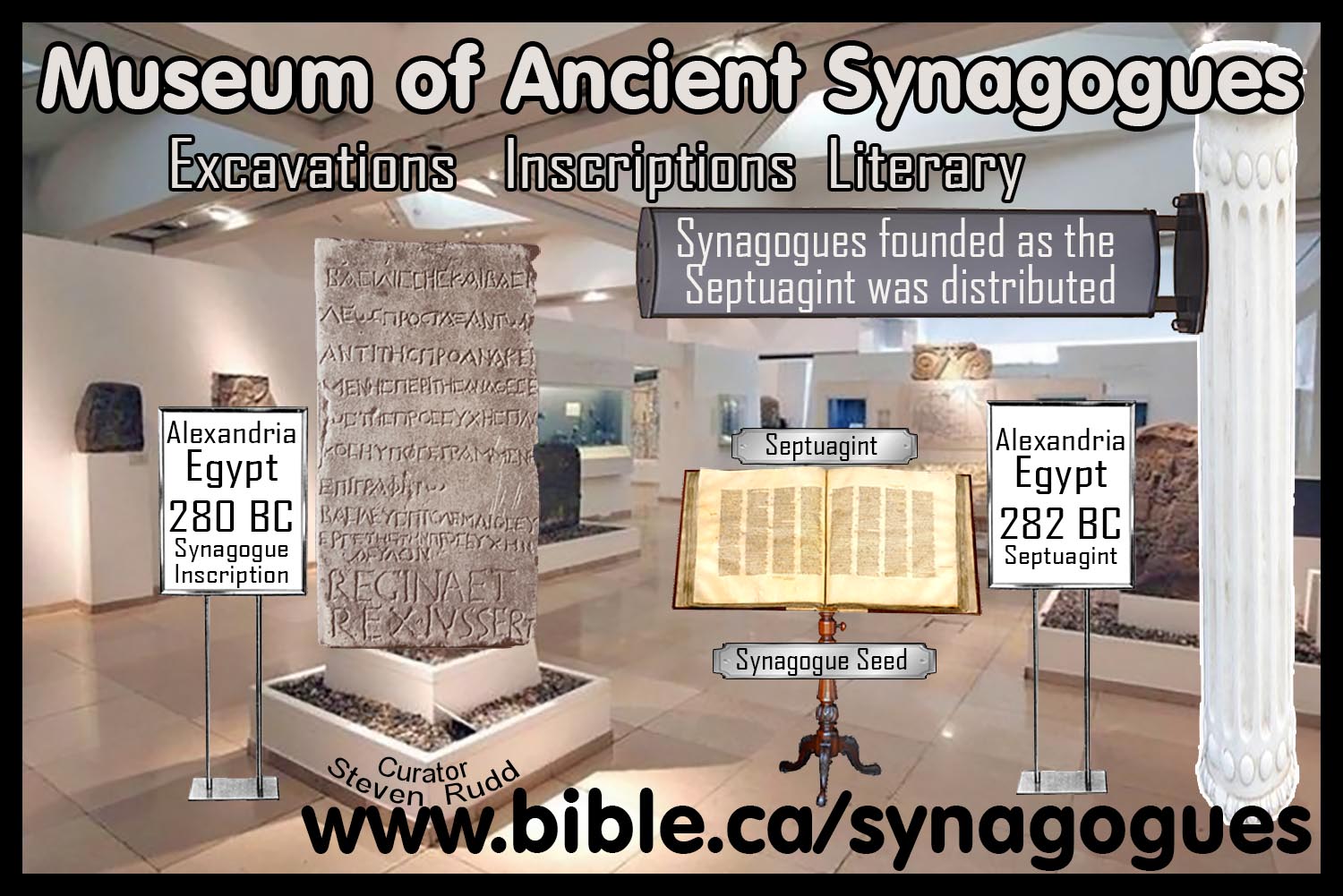
5. The methodical corruption of the entire Genesis 5, 11 chronology is far more than a mere innocent scribal error like the one where Methuselah lives 14 years after the flood. In this Augustine was very wrong and his fellow churchmen were right.
IV. Augustine correctly understood the Genesis variant was a calculated corruption not an accident like the Methuselah scribal error:
1. Augustine’s primary rule: TRUST THE ORIGINAL OVER ANY TRANSLATIONS
a. The problem with this, is that it works when you have ruled out nefarious and deliberate corruptions of the text as clearly happened in the Gen 5,11 chronologies.
b. Augustine preferred the Hebrew original over the translation and says there are extant manuscripts where methesula died before the flood
c. “Or are we perhaps to suppose that there was the still more astute design of concealing the deliberate and uniform addition of 100 years to the first period and their deduction from the subsequent period,—did he design to conceal this by doing something similar, that is to say, adding and deducting, not indeed a century, but some years, even in a case in which there was no need for his doing so? But whatever may be thought of this, whether it be believed that he did so or not, whether, in fine, it be so or not, I would have no manner of doubt that when any diversity is found in the books, since both cannot be true to fact, we do well to believe in preference that language out of which the translation was made into another by translators. For there are three Greek mss., one Latin, and one Syriac, which agree with one another, and in all of these Methuselah is said to have died six years before the deluge. (Augustine, Aug., De civ. Dei 15.13.3)
2. Augustine admits the changes were by a methodical and designed falsification:
a. “But in those cases in which there is a methodical resemblance in the falsification, so that uniformly the one version allots to the period before a son and successor is born 100 years more than the other, and to the period subsequent 100 years less, and vice versâ, so that the totals may agree,—and this holds true of the first, second, third, fourth, fifth, and seventh generations,—in these cases error seems to have, if we may say so, a certain kind of constancy, and savors not of accident, but of design.” (Augustine, Aug., De civ. Dei 15.13.1)
3. Then Augustine concludes, noting many variants between the Greek LXX and Hebrew MT and blames it on the Holy Spirit!!!
a. Augustine’s final conclusion that the clearly calculated alterations in the Genesis chronology was purely the action of a well-meaning scribe operating under the providence of God, is ridiculous. Stupid conclusions indicate another variable which is not known, is the underlying factor.
b. What was this hidden factor? Perhaps Augustine, like many academics today, was more interested in keeping peace with his Jewish opponents, which whom he may have been cooperating in a friendly way in mutual research. If he blamed the corruption on the Jews, they would cut him off from THEIR library and country club dinners. Perhaps he owned them a lot of money and they would call his loan bankrupting him. Perhaps he was business partners and didn’t want to cause trouble in his cash flow.
c. “But that discrepancy of numbers which is found to exist between our own and the Hebrew text does not touch the longevity of the ancients; and if there is any diversity so great that both versions cannot be true, we must take our ideas of the real facts from that text out of which our own version has been translated. However, though any one who pleases has it in his power to correct this version, yet it is not unimportant to observe that no one has presumed to emend the Septuagint from the Hebrew text in the many places where they seem to disagree. For this difference has not been reckoned a falsification; and for my own part I am persuaded it ought not to be reckoned so. But where the difference is not a mere copyist’s error, and where the sense is agreeable to truth and illustrative of truth, we must believe that the divine Spirit prompted them to give a varying version, not in their function of translators, but in the liberty of prophesying. And therefore we find that the apostles justly sanction the Septuagint, by quoting it as well as the Hebrew when they adduce proofs from the Scriptures. (Augustine, Aug., De civ. Dei 15.14.2)
d. There you go! That was simple! Remember, Augustine is a proto-Calvinist.
Conclusion:
1. It never dawned upon Augustine that after both 70 AD and 135 AD a tiny handful of Jews at Zippori controlled and corrupted the only Hebrew text in existence, for anti-Christian purposes in 160 AD, that would end up in the hands of Augustine and eventually become the Masoretic text of 1008 AD. On two different historic occasions, the Jews corrupted their own Bible to counter theological adversaries. The Jews in 160-200 AD corrupted the Genesis chronology for anti-Christian purposes unknowingly following in the footsteps of Ezra in 458 BC who, for anti-Samaritan purposes, changed the location of Joshua’s alter from Mt. Gerizim to Mt Ebal as he converted the Paleo-Hebrew Tanakh into Aramaic Hebrew. Noah got drunk, David committed adultery. Perhaps this one textual corruption was Ezra’s great sin. Notice that in both cases, the entire collection of Hebrew manuscripts were entrusted into the hands of a small number of men who created a single manuscript that would come to dominate the world, all within a population who were Hebrew illiterate and would be unable to detect the changes.
Text of Augustine: City of God, De civ. Dei 15.10 – 15.15.2
Chap. 10.- Of The Different Computation Of The Ages Of The Antediluvians, Given By The Hebrew Manuscripts And By Our Own.
1. Wherefore, although there is a discrepancy for which I cannot account between our manuscripts and the Hebrew, in the very number of years assigned to the antediluvians, yet the discrepancy is not so great that they do not agree about their longevity. For the very first man, Adam, before he begot his son Seth, is in our manuscripts found to have lived 230 years, but in the Hebrew mss. 130. But after he begot Seth, our copies read that he lived 700 years, while the Hebrew give 800. And thus, when the two periods are taken together, the sum agrees. And so throughout the succeeding generations, the period before the father begets a son is always made shorter by 100 years in the Hebrew, but the period after his son is begotten is longer by 100 years in the Hebrew than in our copies. And thus, taking the two periods together, the result is the same in both. And in the sixth generation there is no discrepancy at all. In the seventh, however, of which Enoch is the representative, who is recorded to have been translated without death because he pleased God, there is the same discrepancy as in the first five generations, 100 years more being ascribed to him by our mss. before he begat a son. But still the result agrees; for according to both documents he lived before he was translated 365 years. In the eighth generation the discrepancy is less than in the others, and of a different kind. For Methuselah, whom Enoch begat, lived, before he begat his successor, not 100 years less, but 100 years more, according to the Hebrew reading; and in our mss. again these years are added to the period after he begat his son; so that in this case also the sum-total is the same. And it is only in the ninth generation, that is, in the age of Lamech, Methuselah’s son and Noah’s father, that there is a discrepancy in the sum total; and even in this case it is slight. For the Hebrew mss. represent him as living twenty-four years more than ours assign to him. For before he begat his son, who was called Noah, six years fewer are given to him by the Hebrew Mss than by ours; but after he begat this son, they give him thirty years more than ours; so that, deducting the former six, there remains, as we said, a surplus of twenty-four.
Chap. 11.—Of Methuselah’s Age, Which Seems To Extend Fourteen Years Beyond The Deluge
1. From this discrepancy between the Hebrew books and our own arises the well-known question as to the age of Methuselah; for it is computed that he lived for fourteen years after the deluge, though Scripture relates that of all who were then upon the earth only the eight souls in the ark escaped destruction by the flood, and of these Methuselah was not one. For, according to our books, Methuselah, before he begat the son whom he called Lamech, lived 167 years; then Lamech himself, before his son Noah was born, lived 188 years, which together make 355 years. Add to these the age of Noah at the date of the deluge, 600 years, and this gives a total of 955 from the birth of Methuselah to the year of the flood. Now all the years of the life of Methuselah are computed to be 969; for when he had lived 167 years, and had begotten his son Lamech, he then lived after this 802 years, which makes a total, as we said, of 969 years. From this, if we deduct 955 years from the birth of Methuselah to the flood, there remains fourteen years, which he is supposed to have lived after the flood. And therefore some suppose that, though he was not on earth (in which it is agreed that every living thing which could not naturally live in water perished), he was for a time with his father, who had been translated, and that he lived there till the flood had passed away. This hypothesis they adopt, that they may not cast a slight on the trustworthiness of versions which the Church has received into a position of high authority,2 and because they believe that the Jewish mss. rather than our own are in error. For they do not admit that this is a mistake of the translators, but maintain that there is a falsified statement in the original, from which, through the Greek, the Scripture has been translated into our own tongue. They say that it is not credible that the seventy translators, who simultaneously and unanimously produced one rendering, could have erred, or, in a case in which no interest of theirs was involved, could have falsified their translation; but that the Jews, envying us our translation of their Law and Prophets, have made alterations in their texts so as to undermine the authority of ours. This opinion or suspicion let each man adopt according to his own judgment. Certain it is that Methuselah did not survive the flood, but died in the very year it occurred, if the numbers given in the Hebrew mss. are true. My own opinion regarding the seventy translators I will, with God’s help, state more carefully in its own place, when I have come down (following the order which this work requires) to that period in which their translation was executed. For the present question, it is enough that, according to our versions, the men of that age had lives so long as to make it quite possible that, during the lifetime of the first-born of the two sole parents then on earth, the human race multiplied sufficiently to form a community.
Chap. 12.—Of The Opinion Of Those Who Do Not Believe That In These Primitive, Times Men Lived So Long As Is Stated
1. For they are by no means to be listened to who suppose that in those times years were differently reckoned, and were so short that one of our years may be supposed to be equal to ten of theirs. So that they say, when we read or hear that some man lived 900 years, we should understand ninety, ten of those years making but one of ours, and ten of ours equalling 100 of theirs. Consequently, as they suppose, Adam was twenty-three years of age when he begat Seth, and Seth himself was twenty years and six months old when his son Enos was born, though the Scripture calls these months 205 years. For, on the hypothesis of those whose opinion we are explaining, it was customary to divide one such year as we have into ten parts, and to call each part a year. And each of these parts was composed of six days squared; because God finished His works in six days, that He might rest the seventh. Of this I disputed according to my ability in the eleventh book. Now six squared, or six times six, gives thirty-six days; and this multiplied by ten amounts to 360 days, or twelve lunar months. As for the five remaining days which are needed to complete the solar year, and for the fourth part of a day, which requires that into every fourth or leap-year a day be added, the ancients added such days as the Romans used to call “intercalary,” in order to complete the number of the years. So that Enos, Seth’s son, was nineteen years old when his son Cainan was born, though Scripture calls these years 190. And so through all the generations in which the ages of the antediluvians are given, we find in our versions that almost no one begat a son at the age of 100 or under, or even at the age of 120 or there abouts; but the youngest fathers are recorded to have been 160 years old and upwards. And the reason of this, they say, is that no one can beget children when he is ten years old, the age spoken of by those men as 100, but that sixteen is the age of puberty, and competent now to propagate offspring; and this is the age called by them 160. And that it may not be thought incredible that in these days the year was differently computed from our own, they adduce what is recorded by several writers of history, that the Egyptians had a year of four months, the Acarnanians of six, and the Lavinians of thirteen months. The younger Pliny, after mentioning that some writers reported that one man had lived 152 years, another ten more, others 200, others 300, that some had even reached 500 and 600, and a few 800 years of age, gave it as his opinion that all this must be ascribed to mistaken computation. For some, he says, make summer and winter each a year; others make each season a year, like the Arcadians, whose years, he says, were of three months. He added, too, that the Egyptians, of whose little years of four months we have spoken already, sometimes terminated their year at the wane of each moon; so that with them there are produced lifetimes of 1000 years.
2. By these plausible arguments certain persons, with no desire to weaken the credit of this sacred history, but rather to facilitate belief in it by removing the difficulty of such incredible longevity, have been themselves persuaded, and think they act wisely in persuading others, that in these days the year was so brief that ten of their years equal but one of ours, while ten of ours equal 100 of theirs. But there is the plainest evidence to show that this is quite false. Before producing this evidence, however, it seems right to mention a conjecture which is yet more plausible. From the Hebrew manuscripts we could at once refute this confident statement; for in them Adam is found to have lived not 230 but 130 years before he begat his third son. If, then, this mean thirteen years by our ordinary computation, then he must have begotten his first son when he was only twelve or thereabouts. Who can at this age beget children according to the ordinary and familiar course of nature? But not to mention him, since it is possible he may have been able to beget his like as soon as he was created,—for it is not credible that he was created so little as our infants are,—not to mention him, his son was not 205 years old when he begot Enos, as our versions have it, but 105, and consequently, according to this idea, was not eleven years old. But what shall I say of his son Cainan, who, though by our version 170 years old, was by the Hebrew text seventy when he beget Mahalaleel? If seventy years in those times meant only seven of our years, what man of seven years old begets children?
Chap. 13.—Whether, In Computing Years, We Ought To Follow The Hebrew Or The Septuagint
1. But if I say this, I shall presently be answered, It is one of the Jews’ lies. This, however, we have disposed of above, showing that it cannot be that men of so just a reputation as the seventy translators should have falsified their version. However, if I ask them which of the two is more credible, that the Jewish nation, scattered far and wide, could have unanimously conspired to forge this lie, and so, through envying others the authority of their Scriptures, have deprived themselves of their verity; or that seventy men, who were also themselves Jews, shut up in one place (for Ptolemy king of Egypt had got them together for this work), should have envied foreign nations that same truth, and by common consent inserted these errors: who does not see which can be more naturally and readily believed? But far be it from any prudent man to believe either that the Jews, however malicious and wrong-headed, could have tampered with so many and so widely-dispersed manuscripts; or that those renowned seventy individuals had any common purpose to grudge the truth to the nations. One must therefore more plausibly maintain, that when first their labors began to be transcribed from the copy in Ptolemy’s library, some such misstatement might find its way into the first copy made, and from it might be disseminated far and wide; and that this might arise from no fraud, but from a mere copyist’s error. This is a sufficiently plausible account of the difficulty regarding Methuselah’s life, and of that other case in which there is a difference in the total of twenty-four years. But in those cases in which there is a methodical resemblance in the falsification, so that uniformly the one version allots to the period before a son and successor is born 100 years more than the other, and to the period subsequent 100 years less, and vice versâ, so that the totals may agree,—and this holds true of the first, second, third, fourth, fifth, and seventh generations,—in these cases error seems to have, if we may say so, a certain kind of constancy, and savors not of accident, but of design.
2. Accordingly, that diversity of numbers which distinguishes the Hebrew from the Greek and Latin copies of Scripture, and which consists of a uniform addition and deduction of 100 years in each lifetime for several consecutive generations, is to be attributed neither to the malice of the Jews nor to men so diligent and prudent as the seventy translators, but to the error of the copyist who was first allowed to transcribe the manuscript from the library of the above-mentioned king. For even now, in cases where numbers contribute nothing to the easier comprehension or more satisfactory knowledge of anything, they are both carelessly transcribed, and still more carelessly emended. For who will trouble himself to learn how many thousand men the several tribes of Israel contained? He sees no resulting benefit of such knowledge. Or how many men are there who are aware of the vast advantage that lies hid in this knowledge? But in this case, in which during so many consecutive generations 100 years are added in one manuscript where they are not reckoned in the other, and then, after the birth of the son and successor, the years which were wanting are added, it is obvious that the copyist who contrived this arrangement designed to insinuate that the antediluvians lived an excessive number of years only because each year was excessively brief, and that he tried to draw the attention to this fact by his statement of their age of puberty at which they became able to beget children. For, lest the incredulous might stumble at the difficulty of so long a lifetime, he insinuated that 100 of their years equalled but ten of ours; and this insinuation he conveyed by adding 100 years whenever he found the age below 160 years or thereabouts, deducting these years again from the period after the son’s birth, that the total might harmonize. By this means he intended to ascribe the generation of offspring to a fit age, without diminishing the total sum of years ascribed to the lifetime of the individuals. And the very fact that in the sixth generation he departed from this uniform practice, inclines us all the rather to believe that when the circumstance we have referred to required his alterations, he made them; seeing that when this circumstance did not exist, he made no alteration. For in the same generation he found in the Hebrew ms., that Jared lived before he begat Enoch 162 years, which, according to the short year computation, is sixteen years and somewhat less than two months, an age capable of procreation; and therefore it was not necessary to add 100 short years, and so make the age twenty-six years of the usual length; and of course it was not necessary to deduct, after the son’s birth, years which he had not added before it. And thus it comes to pass that in this instance there is no variation between the two manuscripts.
3. This is corroborated still further by the fact that in the eighth generation, while the Hebrew books assign 182 years to Methuselah before Lamech’s birth, ours assign to him twenty less, though usually 100 years are added to this period; then, after Lamech’s birth, the twenty years are restored, so as to equalize the total in the two books. For if his design was that these 170 years be understood as seventeen, so as to suit the age of puberty, as there was no need for him adding anything, so there was none for his subtracting anything; for in this case he found an age fit for the generation of children, for the sake of which he was in the habit of adding those 100 years in cases where he did not find the age already sufficient. This difference of twenty years we might, indeed, have supposed had happened accidentally, had he not taken care to restore them afterwards as he had deducted them from the period before, so that there might be no deficiency in the total. Or are we perhaps to suppose that there was the still more astute design of concealing the deliberate and uniform addition of 100 years to the first period and their deduction from the subsequent period,—did he design to conceal this by doing something similar, that is to say, adding and deducting, not indeed a century, but some years, even in a case in which there was no need for his doing so? But whatever may be thought of this, whether it be believed that he did so or not, whether, in fine, it be so or not, I would have no manner of doubt that when any diversity is found in the books, since both cannot be true to fact, we do well to believe in preference that language out of which the translation was made into another by translators. For there are three Greek mss., one Latin, and one Syriac, which agree with one another, and in all of these Methuselah is said to have died six years before the deluge. (Augustine, Aug., De civ. Dei 15.13.3)
Chap. 14.—That The Years In Those Ancient Times Were Of The Same Length As Our Own
1. Let us now see how it can be plainly made out that in the enormously protracted lives of those men the years were not so short that ten of their years were equal to only one of ours, but were of as great length as our own, which are measured by the course of the sun. It is proved by this, that Scripture states that the flood occurred in the six hundredth year of Noah’s life. But why in the same place is it also written, “The waters of the flood were upon the earth in the six hundredth year of Noah’s life, in the second month, the twenty-seventh day of the month,” if that very brief year (of which it took ten to make one of ours) consisted of thirty-six days? For so scant a year, if the ancient usage dignified it with the name of year, either has not months, or this month must be three days, so that it may have twelve of them. How then was it here said, “In the six hundredth year, the second month, the twenty-seventh day of the month,” unless the months then were of the same length as the months now? For how else could it be said that the flood began on the twenty-seventh day of the second month? Then afterwards, at the end of the flood, it is thus written: “And the ark rested in the seventh month, on the twenty-seventh day of the month, on the mountains of Ararat. And the waters decreased continually until the eleventh month: on the first day of the month were the tops of the mountains seen.”2 But if the months were such as we have, then so were the years. And certainly months of three days each could not have a twenty-seventh day. Or if every measure of time was diminished in proportion, and a thirtieth part of three days was then called a day, then that great deluge, which is recorded to have lasted forty days and forty nights, was really over in less than four of our days. Who can away with such foolishness and absurdity? Far be this error from us,—an error which seeks to build up our faith in the divine Scriptures on false conjecture only to demolish our faith at another point. It is plain that the day then was what it now is, a space of four-and-twenty hours, determined by the lapse of day and night; the month then equal to the month now, which is defined by the rise and completion of one moon; the year then equal to the year now, which is completed by twelve lunar months, with the addition of five days and a fourth to adjust it with the course of the sun. It was a year of this length which was reckoned the six hundredth of Noah’s life, and in the second month, the twenty-seventh day of the month, the flood began,—a flood which, as is recorded, was caused by heavy rains continuing for forty days, which days had not only two hours and a little more, but four-and-twenty hours, completing a night and a day. And consequently those antediluvians lived more than 900 years, which were years as long as those which afterwards Abraham lived 175 of, and after him his son Isaac 180, and his son Jacob nearly 150, and some time after, Moses 120, and men now seventy or eighty, or not much longer, of which years it is said, “their strength is labor and sorrow.”
2. But that discrepancy of numbers which is found to exist between our own and the Hebrew text does not touch the longevity of the ancients; and if there is any diversity so great that both versions cannot be true, we must take our ideas of the real facts from that text out of which our own version has been translated. However, though any one who pleases has it in his power to correct this version, yet it is not unimportant to observe that no one has presumed to emend the Septuagint from the Hebrew text in the many places where they seem to disagree. For this difference has not been reckoned a falsification; and for my own part I am persuaded it ought not to be reckoned so. But where the difference is not a mere copyist’s error, and where the sense is agreeable to truth and illustrative of truth, we must believe that the divine Spirit prompted them to give a varying version, not in their function of translators, but in the liberty of prophesying. And therefore we find that the apostles justly sanction the Septuagint, by quoting it as well as the Hebrew when they adduce proofs from the Scriptures. But as I have promised to treat this subject more carefully, if God help me, in a more fitting place, I will now go on with the matter in hand. For there can be no doubt that, the lives of men being so long, the first-born of the first man could have built a city,—a city, however, which was earthly, and not that which is called the city of God, to describe which we have taken in hand this great work. (Augustine, Aug., De civ. Dei 15.14.2)
Chap. 15.—Whether It Is Credible That The Men Of The Primitive Age Abstained From Sexual Intercourse Until That Date At Which It Is Recorded That They Begat Children
1. Some one, then, will say, Is it to be believe that a man who intended to beget children, and had no intention of continence, abstained from sexual intercourse a hundred years and more, or even, according to the Hebrew version, only a little less, say eighty, seventy, or sixty years; or, if he did not abstain, was unable to beget offspring? This question admits of two solutions. For either puberty was so much later as the whole life was longer, or, which seems to me more likely, it is not the first-born sons that are here mentioned, but those whose names were required to fill up the series until Noah was reached, from whom again we see that the succession is continued to Abraham, and after him down to that point of time until which it was needful to mark by pedigree the course of the most glorious city, which sojourns as a stranger in this world, and seeks the heavenly country. That which is undeniable is that Cain was the first who was born of man and woman. For had he not been the first who was added by birth to the two unborn persons, Adam could not have said what he is recorded to have said, “I have gotten a man by the Lord.” He was followed by Abel, whom the elder brother slew, and who was the first to show, by a kind of foreshadowing of the sojourning city of God, what iniquitous persecutions that city would suffer at the hands of wicked and, as it were, earth-born men, who love their earthly origin, and delight in the earthly happiness of the earthly city. But how old Adam was when he begat these sons does not appear. After this the generations diverge, the one branch deriving from Cain, the other from him whom Adam begot in the room of Abel slain by his brother, and whom he called Seth, saying, as it is written, “For God hath raised me up another seed for Abel whom Cain slew.”2 These two series of generations accordingly, the one of Cain, the other of Seth, represent the two cities in their distinctive ranks, the one the heavenly city, which sojourns on earth, the other the earthly, which gapes after earthly joys, and grovels in them as if they were the only joys. But though eight generations, including Adam, are registered before the flood, no man of Cain’s line has his age recorded at which the son who succeeded him was begotten. For the Spirit of God refused to mark the times before the flood in the generations of the earthly city, but preferred to do so in the heavenly line, as if it were more worthy of being remembered. Further, when Seth was born, the age of his father is mentioned; but already he had begotten other sons, and who will presume to say that Cain and Abel were the only ones previously begotten? For it does not follow that they alone had been begotten of Adam, because they alone were named in order to continue the series of generations which it was desirable to mention. For though the names of all the rest are buried in silence, yet it is said that Adam begot sons and daughters; and who that cares to be free from the charge of temerity will dare to say how many his offspring numbered? It was possible enough that Adam was divinely prompted to say, after Seth was born, “For God hath raised up to me another seed for Abel,” because that son was to be capable of representing Abel’s holiness, not because he was born first after him in point of time. Then because it is written, “And Seth lived 205 years,” or, according to the Hebrew reading, “105 years, and begat Enos,” who but a rash man could affirm that this was his first-born? Will any man do so to excite our wonder, and cause us to inquire how for so many years he remained free from sexual intercourse, though without any purpose of continuing so, or how, if he did not abstain, he yet had no children? Will any man do so when it is written of him, “And he begat sons and daughters, and all the days of Seth were 912 years, and he died?” And similarly regarding those whose years are afterwards mentioned, it is not disguised that they begat sons and daughters.
Consequently it does not at all appear whether he who is named as the son was himself the first begotten. Nay, since it is incredible that those fathers were either so long in attaining puberty, or could not get wives, or could not impregnate them, it is also incredible that those sons were their first-born. But as the writer of the sacred history designed to descend by well-marked intervals through a series of generations to the birth and life of Noah, in whose time the flood occurred, he mentioned not those sons who were first begotten, but those by whom the succession was handed down.
2. Let me make this clearer by here inserting an example, in regard to which no one can have any doubt that what I am asserting is true. The evangelist Matthew, where he designs to commit to our memories the generation of the Lord’s flesh by a series of parents, beginning from Abraham and intending to reach David, says, “Abraham begat Isaac;” why did he not say Ishmael, whom he first begat? Then “Isaac begat Jacob;” why did he not say Esau, who was the first-born? Simply because these sons would not have helped him to reach David. Then follows, “And Jacob begat Judah and his brethren:” was Judah the first begotten? “Judah,” he says, “begat Pharez and Zara;” yet neither were these twins the first-born of Judah, but before them he had begotten three other sons. And so in the order of the generations he retained those by whom he might reach David, so as to proceed onwards to the end he had in view. And from this we may understand that the antediluvians who are mentioned were not the first-born, but those through whom the order of the succeeding generations might be carried on to the patriarch Noah. We need not, therefore, weary ourselves with discussing the needless and obscure question as to their lateness of reaching puberty.
|
The Septuagint LXX “Scripture Cannot Be Broken” |
|||||
|
Start Here: Master Introduction and Index |
|||||
|
Six Bible Manuscripts |
|||||
|
1446 BC Sinai Text (ST) |
1050 BC Samuel’s Text (SNT) |
623 BC Samaritan (SP) |
458 BC Ezra’s Text (XIV) |
282 BC Septuagint (LXX) |
160 AD Masoretic (MT) |
|
Research Tools |
|||||
|
Steve Rudd, November 2017 AD: Contact the author for comments, input or corrections |
|||||
By Steve Rudd: November 2017: Contact the author for comments, input or corrections.
Go to: Main Bible Manuscripts Page
Go to: Main Ancient Synagogue Start Page

